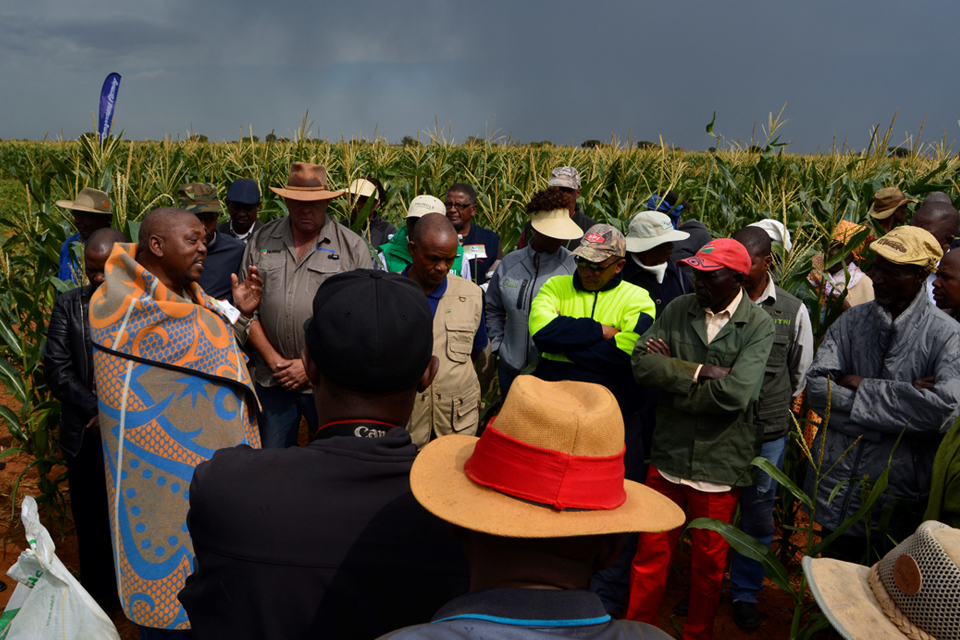May 29, 2018


Lead host farmer for the walk, Mr Sello Motseko taking the delegation through a tour of his field.
The Climate Change division, on Thursday 3 May, hosted Barolong Annual Field Day and a farm walk in Tlhareseleele in the Borolong District. Held under the theme “Climate Smart Agriculture: Ensuring Sustainable Production Under Uncertain Climatic Conditions” , the objective of the event, as a follow up of the 2017 edition, was to promote the use of Climate Smart Agriculture practices in rain-fed agriculture.
In his giving an Overview of the event, the Secretary of the Goodhope Crop Farmers Association Mr. Masen acknowledge the contribution of the traditional leadership, Department of Agricultural Research office in the region, the Department of Meteorological Services and BITRI in contributing support, expertise and resources to growing the agricultural sector in Borolong.
“The quality of a successful farming enterprise does not necessarily depend on the size of the field. You may have a big farm, but yield less harvest than a subsistence farmer with only two hectares of farmland. The target should be for a farmer to yield over sixty bags of grain per hectare, and if you fall way below that standard, then, you should reconsider your farming and farm management practices,” elaborated Mr. Masen.
Mr. Masen said a delegation of the Goodhope Crop Farmers Association took a familiarization tour of some farms in the Free State in South Africa, and learnt some of the best practices in integrated farming which they aim to use to re-establish the Barolong farms as the granary of the nation. Mr. Masen extended gratitude towards BITRI for its intervention, which invariably lead to an improvement in yields for beneficiary farmers.
The day culminated in a farm tour and the lead host farmer for the walk, Mr Sello Motseko took the delegation through a tour of his field. Mr Motseko explained how he managed his operation to the audience, amongst them dikgosi, farmers, Extension Officers, and representatives of the various Government functions.
“My field is about eight hectares. I am on hand every day, and I participate in every aspect from ploughing, weeding, to harvesting. I am always on site, and I remember even the contractor who ploughed my field this year complimented me for my dedication because I was there every day, directing him on how I want my field to be ploughed. With this small field, my harvest per hectare is more than sufficient to make farming a sustainable business for me. My family, including children, also contribute labour and expertise in managing our enterprise,” stressed Mr. Motseko.
On the second leg of the tour, the delegation proceeded to Mr. Cronje’s farm. Mr. Cronje is a commercial farmer whose field is two hundred (200) hectares in size. The quality of the crop in Mr. Motseko and Mr. Cronje’s fields were of similar quality, confirming the principle that farming practices, regardless of the size of the field, are the principal determinant of the success of a farming enterprise.
Mr. Cronje explained how a farmer should chose breeds based on the availability of rainfall, as well as other concomitant conditions.
“The amount of rainfall has generally decreased, therefore, we choose cultivars based on the time of ploughing. Some varieties take a longer time to harvest, and would be best suitable during a season where there is plenty of rainfall. Since this year the rains came late, I chose a variety with early maturity, excellent drought tolerance rate and good tolerance to grey leaf spot,” said Mr. Cronje.
Mr. Cronje advised upcoming farmers not to place paramount importance on the size of the farm, but work on good farming practices, amongst them good spacing of crops, which in his decades of experience, can attest that it leads to better yields per hectare.
During Keynote Address, BITRI Associate Researcher – Climate Change & Society, Ms. Kgomotsego Motlopi gave an overview the Climate Change division and the contribution of the Climate Smart Agriculture (CSA) initiative. The initiative was preceded by a study that identified risk factors to rain-fed agriculture, chief among which, were erratic rainfall and high temperatures. The beneficiary farmers of the CSA are supported with fertilizers, hybrid maize and cowpea seeds that mature early and give good returns and are encouraged to adopt the climate smart production methods that focuses on moisture and soil conservation. A dedicated team from the Climate Change division monitors the projects on a continuous basis. The project initially targeted dry land small scale farmers in Barolong and Kgalagadi South Sub-District, and has been extended and modified to cover similar scale farmers in the Northeast District.
BITRI had invited and facilitated logistics for farmers Barolong and Kgalagadi South Sub-District, as well as the Northeast District for them to learn from farmers who have adopted Climate Smart Agriculture practices.

